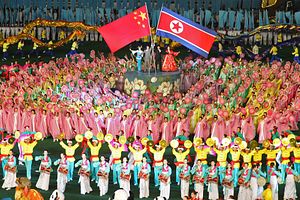The idea going around in the West these days is that Beijing and Pyongyang are not on good terms. Given the regional importance and historic strength of this relationship, such claims deserve careful attention.
According to a 2015 European Council on Foreign Relations scorecard, China began distancing itself from North Korea after its 2013 nuclear test. China took further steps in 2014, meeting several times with South Korean leaders, including the July 2014 trip when Xi broke tradition by visiting Seoul before visiting Pyongyang. At the time, the Atlantic Sentinel reported that Xi is “distancing China” from Pyongyang, while The Guardian wrote, “China Snubs North Korea” and a New York Times headline read, “Chinese Annoyance with North Korea Bubbles to the Surface.” Other commentators went even further writing, “China Kinda Hates North Korea” or discussing “Why China Hates North Korea.”
Meanwhile, in an article for The Diplomat last February titled, “What China and North Korea Really Think of Each Other,” Kerry Brown reported on Xi’s “glaring” failure to visit Pyongyang and quoted Dear Leader, the memoir of former North Korean counter-intelligence operative Jang Jin-sung, who defected to South Korea in 2004. In his book, Jang says, “the country Kim Jong-il hates most is China.” So then, do Beijing and Pyongyang hate each other?
The simple answer is that it probably doesn’t matter. Beijing and Pyongyang are too important to each other to end their relationship anytime soon. Brown points out that North Korea is increasingly a worry as Xi promotes the “China Dream” and the new Silk Road and improves relations abroad. However, the reason North Korea is a worry is because of its importance to the future of Asia. This is something Beijing leaders, including Xi, fully realize. In a recent Stratfor study, Rodger Baker writes that China is “growing frustrated with North Korea’s behavior,” but points out that the relationship between these nations, rather than being ideological in nature, is actually based on “security calculations.” Baker argues that North Korea is important to China as a buffer state, shielding China from Western influence in much the same way that the Ukraine now shields Russia, and he points out that North Korea is crucial in ensuring that any future Korean reunification leans toward Beijing.
Baker adds that Beijing might be pretending to grow tired of North Korea in order to “trade their assistance with North Korea for political concessions elsewhere.” The problem with playing the long game, however, is that time is running out. North Korean actions are beginning to trigger “expanded U.S. missile defense,” “Japanese remilitarization,” and “increased potential for closer Japanese-South Korean military cooperation.”
In trying to calm the waters, Beijing has remained a member of the Six-Party Talks over the North Korean nuclear program, since the program has the potential to draw China into war. Still, China’s distaste for Pyongyang’s nuclear ambitions doesn’t necessarily mean that Beijing is walking away from the relationship, as Western media suggest.
As for Pyongyang, it is currently too dependent on China to consider alienating it. For instance, the 1961 Sino-North Korean Mutual Aid and Cooperation Friendship Treaty, which promises Chinese military aid to North Korea in the event of an attack, was resigned again in 2001 and is now valid until 2021. Also, North Korea gets most of its oil and gas from China, and half of China’s foreign aid goes to North Korea, giving it breathing room when facing the United Nations. Most importantly, China is North Korea’s largest trade partner, accounting for 57 percent of North Korean imports and 42 percent of its exports. In other words, for all its saber-rattling, North Korea cannot afford not to negotiate if Beijing applies enough pressure, although so far Beijing has shown no interest in forcing Pyongyang’s hand.
Beijing also knows that much of North Korea’s seemingly short-sighted military actions are in fact anything but that. According to analysis by Sung-Yoon Lee, since North Korea cannot compete with South Korea economically, it relies “on military and political brinkmanship to make up ground.” By doing so, despite its limited resources, Pyongyang has been able to move impressive amounts of political weight.
While North Korea relies heavily on Chinese trade and energy, it is also a central part of Beijing’s regional strategic goals. Therefore, Beijing’s position regarding Pyongyang’s nuclear program should not be taken as a reflection of its attitude toward Pyongyang in general. While reports of a change in mood are perhaps partly true, they have been inflated by Western wishful thinking.

































